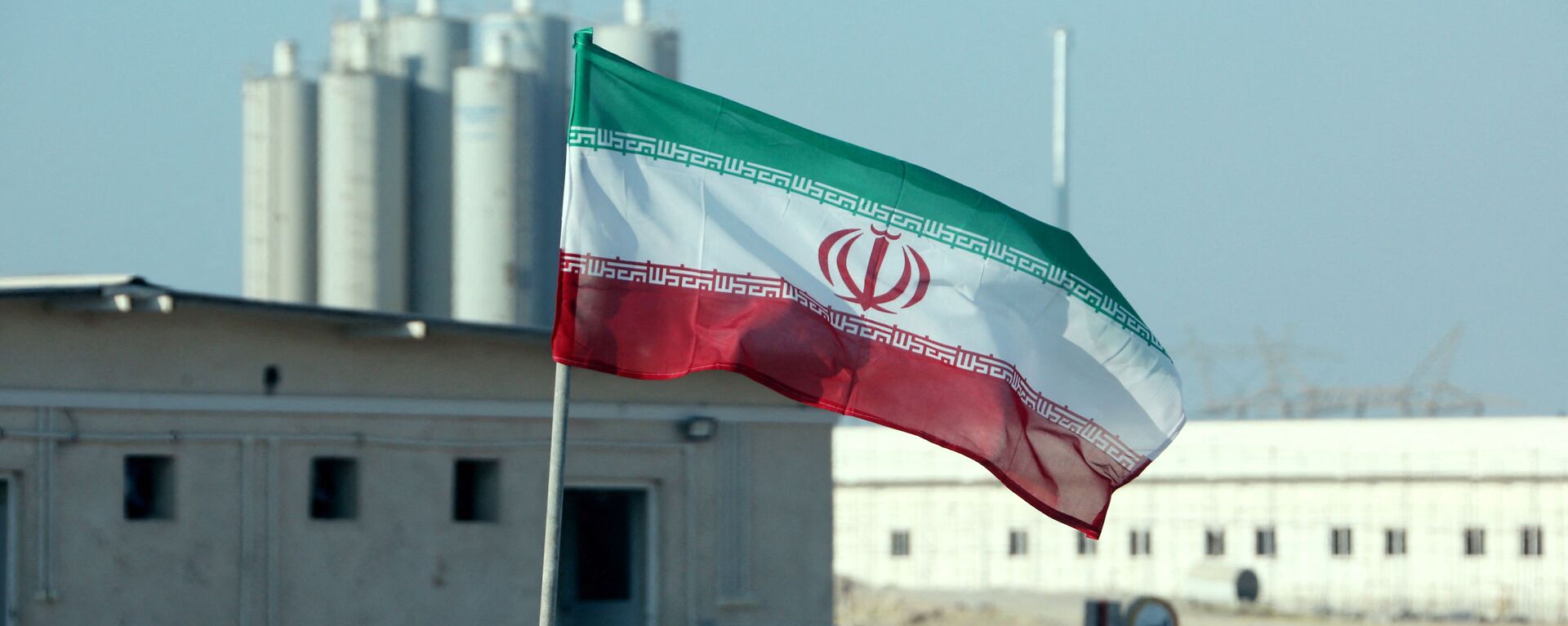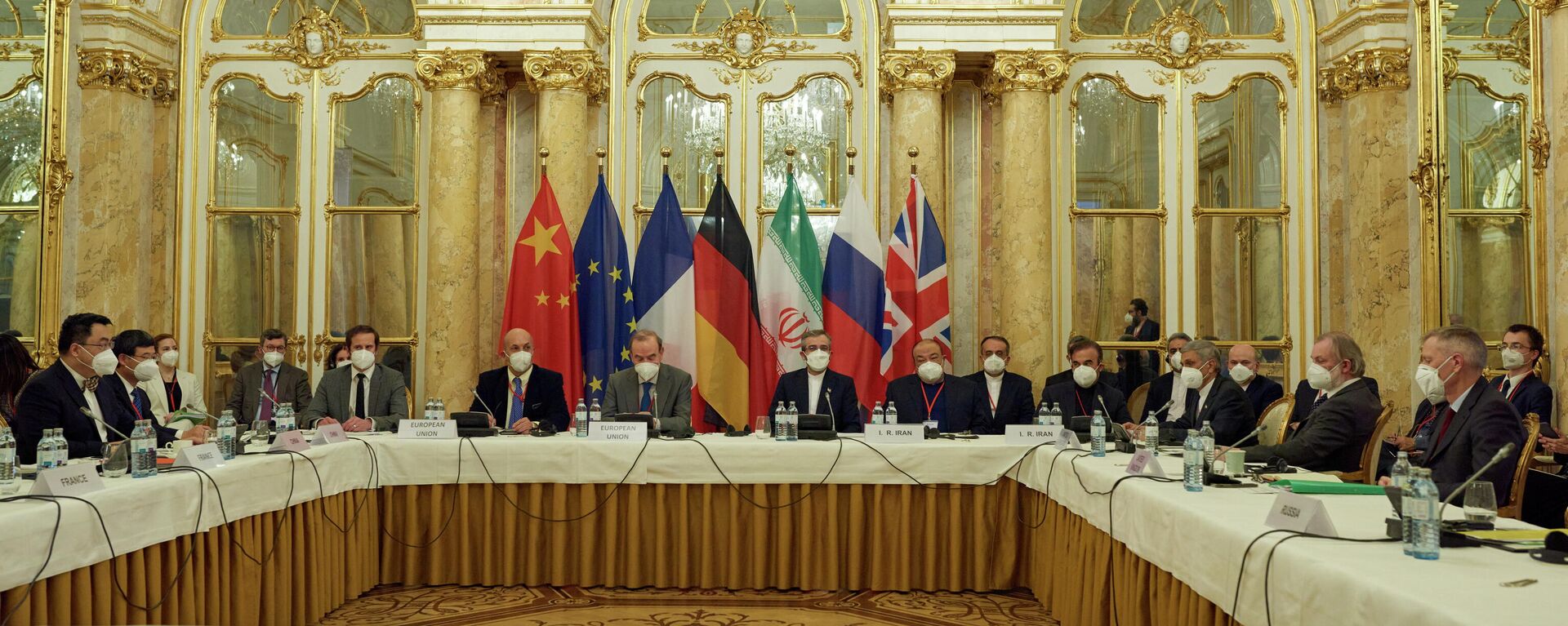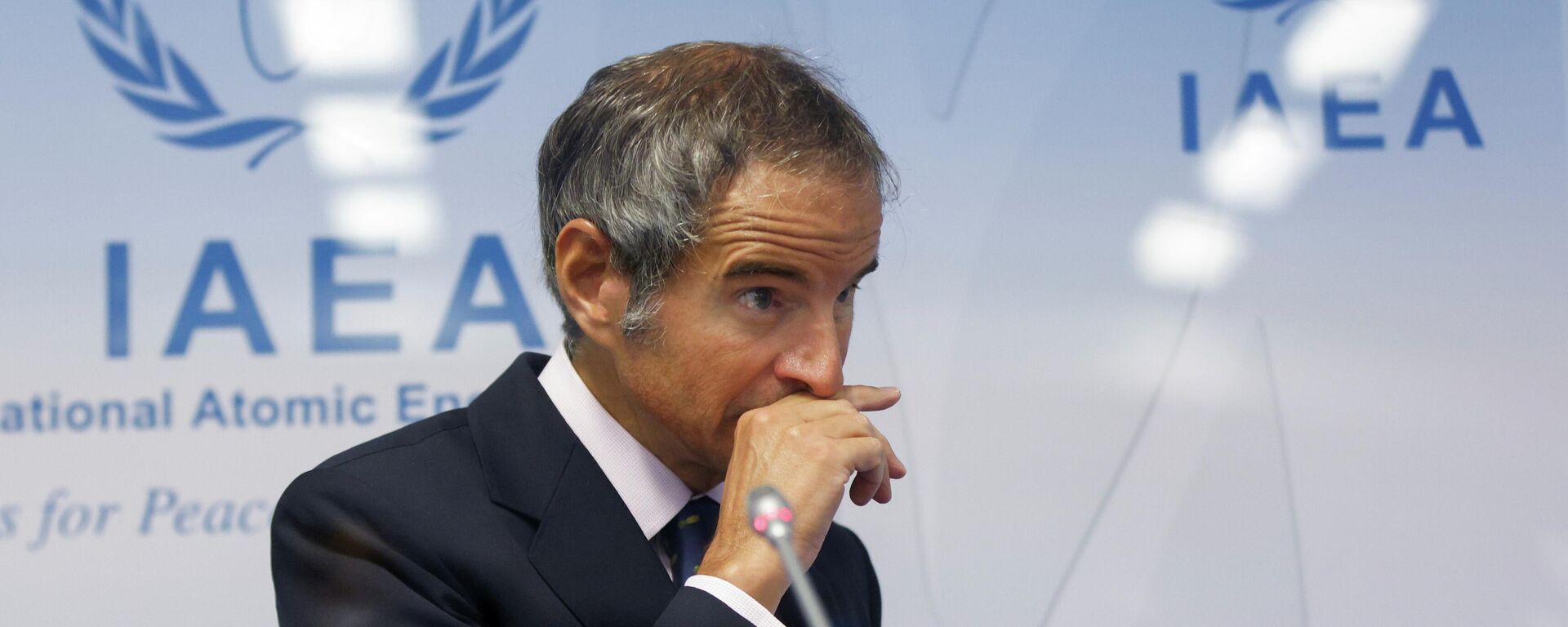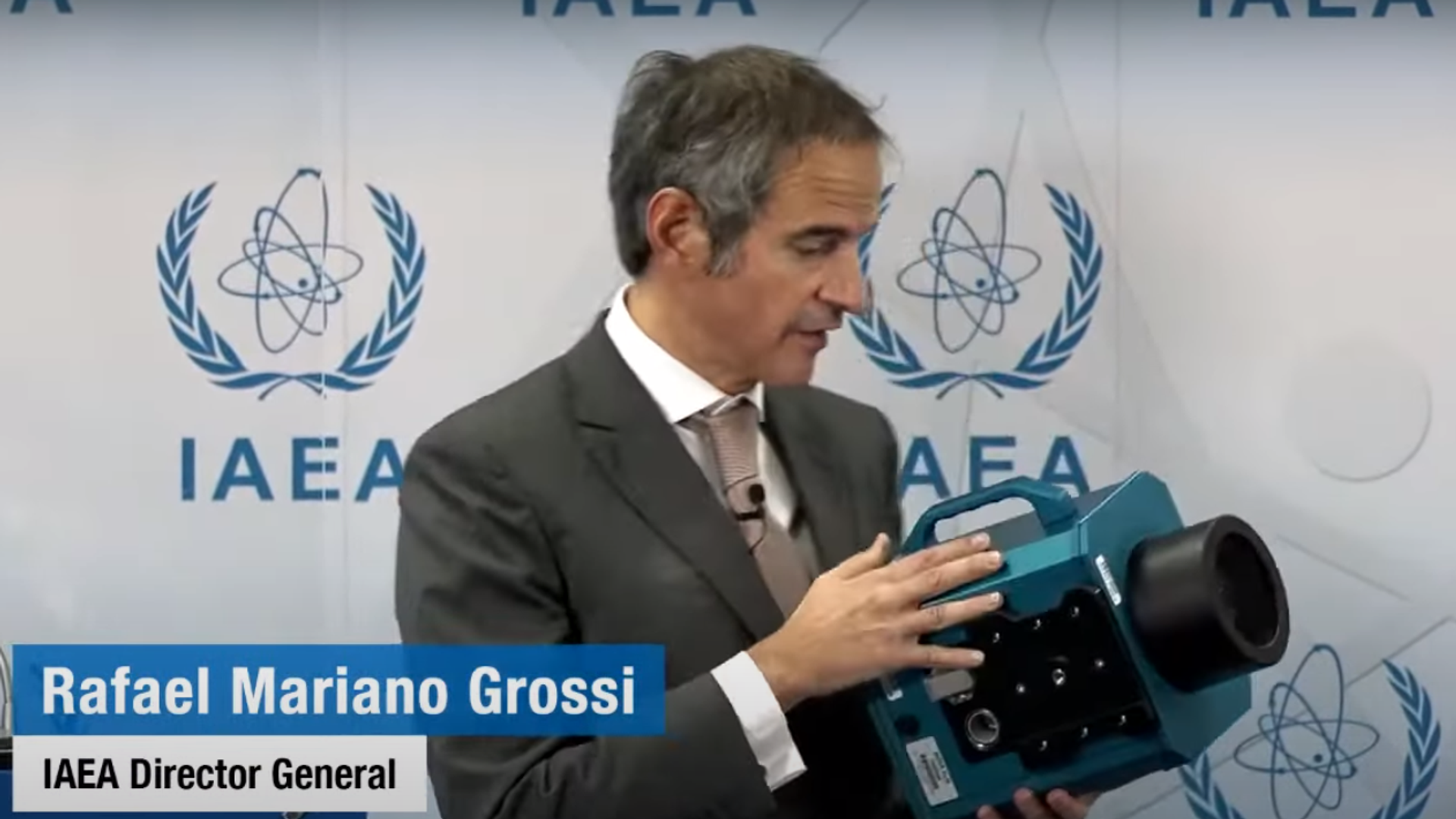https://sputnikglobe.com/20211217/iaea-doubts-security-footage-at-iranian-nuclear-facility-hit-by-mossad-sabotage-simply-disappeared-1091613583.html
IAEA ‘Doubts’ Security Footage at Iranian Nuclear Facility Hit by Mossad Sabotage Simply Disappeared
IAEA ‘Doubts’ Security Footage at Iranian Nuclear Facility Hit by Mossad Sabotage Simply Disappeared
Sputnik International
Iran’s peaceful nuclear programme is subject to a strict safeguards regime enforced by the International Atomic Energy Agency (IAEA). The nuclear watchdog has... 17.12.2021, Sputnik International
2021-12-17T18:55+0000
2021-12-17T18:55+0000
2021-12-17T18:55+0000
international atomic energy agency (iaea)
iran
camera
https://cdn1.img.sputnikglobe.com/img/07e5/0c/11/1091613448_83:0:1345:710_1920x0_80_0_0_d62539055d1259cf0131779aa29f745b.png
The IAEA has “doubts” that that the footage from one of the four agency cameras installed at Karaj nuclear centrifuge parts facility simply disappeared after June’s suspected Mossad sabotage attack against the plant, agency chief Rafael Grossi has said.Speaking at a press conference on Friday, Grossi said the agency has “doubts about” the fate of the footage “and this is why were are asking – where is it?”The IAEA had four cameras monitoring the Karaj plant before the June sabotage that destroyed the facility. Iran showed the agency the cameras and the storage media containing footage, but not that of the camera suspected of being destroyed in the sabotage, prompting the agency and its Western curators to demand an explanation from Tehran.Iran and the IAEA reached an agreement Wednesday to replace the cameras at the Karaj facility amid the negotiations in Vienna to reactivate the 2015 Iran nuclear agreement. The agency said this week that the agreement on the cameras would “enable us to resume necessary continuity of knowledge at this facility,” with the equipment expected to be installed “in [the] coming days.”However, a spokesperson from the Atomic Energy Organization of Iran clarified that the surveillance cameras would be installed only after a meticulous technical, security and judicial review, with IAEA technicians expected to answer any questions Iranian security and safety questions may have about the devices.The spokesman also indicated that Iran would hold on to the footage snapped by the cameras and hand it over to the IAEA only after sanctions are lifted, until which time the full storage devices would be removed and placed under the joint control of Iran and the agency.Negotiations in Vienna to revive the Iran nuclear agreement resumed at the start of December, with diplomats from the European Three (Britain, France and Germany) parties releasing a joint statement Friday warning that while some “technical progress” had been made over the past 24 hours, “this only takes us back nearer to where the talks stood in June.”“We are rapidly reaching the end of the road for this negotiation,” the European negotiators warned.The stalemate between Iran and the US in the nuclear negotiations is centered around which country is to take the first steps to live up to its commitments under the agreement, which the Trump administration walked out of in 2018 amid lobbying from Israel.Iran says that the US side, as the instigator of the agreement’s suspension, must first remove its harsh sanctions against the Islamic Republic. Washington has countered by demanding that Iran first reduce its uranium enrichment and stockpiling activities in accordance with limits set by the nuclear deal. Iran has also accused the US and its allies of attempting to trick Tehran by adding a clause in the nuclear talks about Iran’s regional foreign policy and missile arsenal. Iranian negotiators and diplomats have categorically dismissed any attempts to alter the original agreement.In an interview with the Associated Press on Tuesday, the IAEA’s Grossi suggested that the world was dealing with “a very different Iran” today than it was in 2015, and that “adjustments” would have to be made to adjust to these new realities.
https://sputnikglobe.com/20211216/us-is-utterly-dishonest-why-tehran-wont-accept-partial-removal-of-sanctions-by-washington-1091576416.html
https://sputnikglobe.com/20211215/iran-imposes-no-preconditions-or-new-conditions-in-vienna-nuclear-talks---envoy-to-un-1091528920.html
https://sputnikglobe.com/20211215/iaea-chief-says-2015-nuclear-deal-needs-adjustments-in-2022-for-a-very-different-iran-1091555965.html
iran
Sputnik International
feedback@sputniknews.com
+74956456601
MIA „Rosiya Segodnya“
2021
News
en_EN
Sputnik International
feedback@sputniknews.com
+74956456601
MIA „Rosiya Segodnya“
Sputnik International
feedback@sputniknews.com
+74956456601
MIA „Rosiya Segodnya“
international atomic energy agency (iaea), iran, camera
international atomic energy agency (iaea), iran, camera
IAEA ‘Doubts’ Security Footage at Iranian Nuclear Facility Hit by Mossad Sabotage Simply Disappeared
Iran’s peaceful nuclear programme is subject to a strict safeguards regime enforced by the International Atomic Energy Agency (IAEA). The nuclear watchdog has repeatedly clashed with Tehran over issues related to the security cameras installed to monitor the Islamic Republic’s nuclear facilities.
The IAEA has “doubts” that that the footage from one of the four agency cameras installed at Karaj nuclear centrifuge parts facility simply disappeared after June’s suspected
Mossad sabotage attack against the plant, agency chief Rafael Grossi has said.
Speaking at a press conference on Friday, Grossi
said the agency has “doubts about” the fate of the footage “and this is why were are asking – where is it?”
“I’m hopeful [the Iranians] are going to come up with an answer because it’s very strange that it disappears,” Grossi added.
The IAEA had four cameras monitoring the Karaj plant before the June sabotage that destroyed the facility. Iran showed the agency the cameras and the storage media containing footage, but not that of the camera suspected of being destroyed in the sabotage, prompting the agency and its Western curators to demand an explanation from Tehran.

16 December 2021, 15:44 GMT
Iran and the IAEA reached an agreement Wednesday to replace the cameras at the Karaj facility amid the negotiations in Vienna to reactivate the 2015 Iran nuclear agreement. The agency said this week that the agreement on the cameras would “enable us to resume necessary continuity of knowledge at this facility,” with the equipment expected to be installed “in [the] coming days.”
However, a spokesperson from the Atomic Energy Organization of Iran clarified that the surveillance cameras would be installed only after a meticulous technical, security and judicial review, with IAEA technicians expected to answer any questions Iranian security and safety questions may have about the devices.
The spokesman also indicated that Iran would hold on to the footage snapped by the cameras and hand it over to the IAEA only after sanctions are lifted, until which time the full storage devices would be removed and placed under the joint control of Iran and the agency.
Negotiations in Vienna to revive the Iran nuclear agreement resumed at the start of December, with diplomats from the European Three (Britain, France and Germany) parties releasing a joint statement Friday warning that while some “technical progress” had been made over the past 24 hours, “this only takes us back nearer to where the talks stood in June.”

15 December 2021, 01:51 GMT
“We are rapidly reaching the end of the road for this negotiation,” the European negotiators warned.
The stalemate between Iran and the US in the nuclear negotiations is centered around which country is to take the first steps to live up to its commitments under the agreement, which the Trump administration walked out of in 2018 amid lobbying from Israel.
Iran says that the US side, as the instigator of the agreement’s suspension, must first remove its harsh sanctions against the Islamic Republic. Washington has countered by demanding that Iran first reduce its uranium enrichment and stockpiling activities in accordance with limits set by the nuclear deal. Iran has also accused the US and its allies of attempting to trick Tehran by adding a clause in the nuclear talks about Iran’s regional foreign policy and missile arsenal. Iranian negotiators and diplomats have categorically dismissed any attempts to alter the original agreement.
In an interview with the Associated Press on Tuesday, the IAEA’s Grossi suggested that the world was dealing with “a very different Iran” today than it was in 2015, and that “adjustments” would have to be made to adjust to these new realities.

15 December 2021, 23:34 GMT






